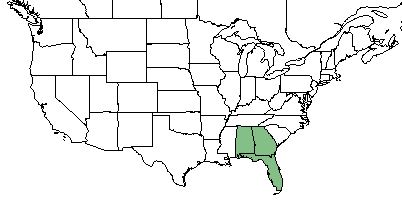Difference between revisions of "Eustachys floridana"
(→Distribution) |
(→Description) |
||
| Line 25: | Line 25: | ||
==Description== | ==Description== | ||
<!-- Basic life history facts such as annual/perrenial, monoecious/dioecious, root morphology, seed type, etc. --> | <!-- Basic life history facts such as annual/perrenial, monoecious/dioecious, root morphology, seed type, etc. --> | ||
| − | ''E. floridana'' is a perennial graminoid of the ''Poaceae'' family native to North America. <ref name= "USDA Plant Database"> USDA Plant Database [https://plants.usda.gov/core/profile?symbol=EUFL3 https://plants.usda.gov/core/profile?symbol=EUFL3] </ref> | + | ''E. floridana'' is a perennial graminoid of the ''Poaceae'' family native to North America.<ref name= "USDA Plant Database"> USDA Plant Database [https://plants.usda.gov/core/profile?symbol=EUFL3 https://plants.usda.gov/core/profile?symbol=EUFL3] </ref> |
==Distribution== | ==Distribution== | ||
Revision as of 13:55, 13 May 2019
Common name: twospike fingergrass [1], Florida fingergrass [2]
| Eustachys floridana | |
|---|---|
| Scientific classification | |
| Kingdom: | Plantae |
| Division: | Magnoliophyta - Flowering plants |
| Class: | Liliopsida - Moncots |
| Order: | Poales |
| Family: | Poaceae |
| Genus: | Eustachys |
| Species: | E. floridana |
| Binomial name | |
| Eustachys floridana Chapm. | |

| |
| Natural range of Eustachys floridana from USDA NRCS Plants Database. | |
Contents
Taxonomic Notes
Synonyms: Chloris floridana (Chapman) Wood
Varieties: none
Description
E. floridana is a perennial graminoid of the Poaceae family native to North America.[1]
Distribution
E. floridana is found in Alabama, Georgia, and Florida.[1] Within this range, it is found from eastern Georgia south to central peninsular Florida and west to the western panhandle of Florida and southern Alabama.[2]
Ecology
Habitat
E. floridana proliferates in sandhills and pine flatwoods [2], as well as pine rocklands and marl prairies [3] Specimens have been collected from open oak woods, open longleaf sandhill, flatwoods, and wiregrass sandhill communities. [4]
Phenology
E. floridana is a perennial herb to 1 m tall; raceme rachis wingless, triangular, fertile lemma pale or gray. [3]
Seed dispersal
This species is thought to be dispersed by wind. [5]
Conservation and Management
Cultivation and restoration
Photo Gallery
References and notes
- ↑ 1.0 1.1 1.2 USDA Plant Database https://plants.usda.gov/core/profile?symbol=EUFL3
- ↑ 2.0 2.1 2.2 Weakley, A. S. (2015). Flora of the Southern and Mid-Atlantic States. Chapel Hill, NC, University of North Carolina Herbarium.
- ↑ 3.0 3.1 Coile, N. C. (2000). Notes on Florida �s Regulated Plant Index (Rule 5B-40), Botany Contribution No. 38, 3nd edition. Gainesville, Florida, Florida Deaprtment of Agriculture and Consumer Services, Division of Plant Industry.
- ↑ URL: http://herbarium.bio.fsu.edu. Last accessed: June 2018. Collectors: R. Kral, Loran C. Anderson, H. Kurz, R.K. Godfrey, J. P. Gillespie, R.E. Perdue, Richard Carter, W.W. Baker. States and counties: Florida (Wakulla, Madison, Leon, Suwannee) Georgia (Thomas, Baker)
- ↑ Kirkman, L. Katherine. Unpublished database of seed dispersal mode of plants found in Coastal Plain longleaf pine-grasslands of the Jones Ecological Research Center, Georgia.